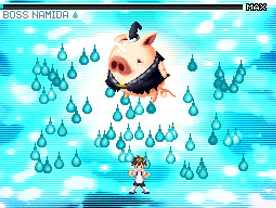
You may have noticed that I haven’t exactly focused on the smaller titles at Tokyo Game Show this year — either here or during my coverage for 1UP or GameSpy. And that’s partly because, well, there weren’t really any niche titles of note. Last year, I could spend hours hanging out at Marvelous’ booth checking out games like Arc Rise Fantasia and Muramasa: The Demon Blade. And I think it’s that TGS buzz that helped Muramasa garner such a large Western audience — but what if it had been absent from last year’s show? Would it still be in the same position today? I’m not so sure.
We’re entering a new era in Japanese gaming — perhaps a second wave of excellent games not receiving localization treaments, a problem that hasn’t really concerned Western gamers in over a decade. In the recent past, it’s likely games such as Sakura Note (legendary Square Enix composer Nobuo Uematsu and Kazushige Nojima of Kingdom Hearts fame) and 7th Dragon (Rieko Kodama of Phantasy Star and Skies of Arcadia and Kazuya Niinou of Trauma Center and Etrian Odyssey) would’ve been localized based on their pedigree alone. But these days, even star-studded projects are up in the air.
And a scaled-down TGS doesn’t do smaller games any favors in coming over, as the American branches of niche publishers often use TGS as a chance to check out potential titles. Well, if they don’t see these games in action, then that greatly impacts the chances of these titles to come over. So with that in mind, why did so many publishers bow out of the show? Marvelous provided at least one answer, and it’s pretty much what you’d expect.
“Unfortunately, like many other publishers, we didn’t have a booth at the TGS this year,” Tami Otto of Marvelous’ licensing and producing department told French-language gaming site LiveWii. “As you know, the market is tough at the moment, and Marvelous decided to save the money for other investments.”
The problem, of course, is determining what, exactly, these “investments” will be — for Marvelous or any other Japanese publisher.

One TGS bright spot was Capcom’s Ghost Trick. The new mystery adventure from Phoenix Wright creator Shu Takumi oozed everything Japanese games are famous for — style, memorable characters, and creative twists on genre conventions while retaining some of that niche vibe. But even a relatively under-the-radar game like Ghost Trick has the weight of the Ace Attorney franchise behind it.
I know there’s a place for Tokyo Game Show in the gaming landscape — Japanese development is too important to the core of the industry to abandon the expo. I think that, like E3 before it, the TGS organizers need to take a step back and determine the best way to showcase all the best titles — not just the ones with the most money behind them. Simply scaling down the show or keeping the costs prohibitive for publishers like Marvelous isn’t the answer.


